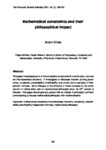Mathematical constraints and their philosophical impact
| dc.contributor.author | Stiles, Adam | |
| dc.date.accessioned | 2021-07-08T20:22:21Z | |
| dc.date.available | 2021-07-08T20:22:21Z | |
| dc.date.issued | 2021 | |
| dc.identifier.citation |
Stiles, A. (2021) ‘Mathematical constraints and their philosophical impact’, The Plymouth Student Scientist, 14(1), pp. 405-451. | en_US |
| dc.identifier.uri | http://hdl.handle.net/10026.1/17327 | |
| dc.description.abstract |
This paper investigates some of the constraints encountered in mathematics. It proves the incompleteness theorems. It investigates or discusses theorem proving procedures, complexity, undecidability, undefinability, and covers some examples of independent formulas. Some dialogue on the influence of these concepts on the development of mathematics, and on mathematical philosophy since the 20th century is included. This paper should give any person with an interest in philosophy sufficient understanding to discuss mathematical philosophy with mathematicians. | en_US |
| dc.language.iso | en | en_US |
| dc.publisher | University of Plymouth | en_US |
| dc.rights | Attribution 3.0 United States | * |
| dc.rights.uri | http://creativecommons.org/licenses/by/3.0/us/ | * |
| dc.subject | mathematical constraints | en_US |
| dc.subject | incompleteness theorems | en_US |
| dc.subject | complexity | en_US |
| dc.subject | undecidability | en_US |
| dc.subject | undefinability | en_US |
| dc.subject | independent formulas | en_US |
| dc.subject | mathematical philosophy | en_US |
| dc.title | Mathematical constraints and their philosophical impact | en_US |
| dc.type | Article | en_US |
| plymouth.issue | 1 | |
| plymouth.volume | 14 | |
| plymouth.journal | The Plymouth Student Scientist |



